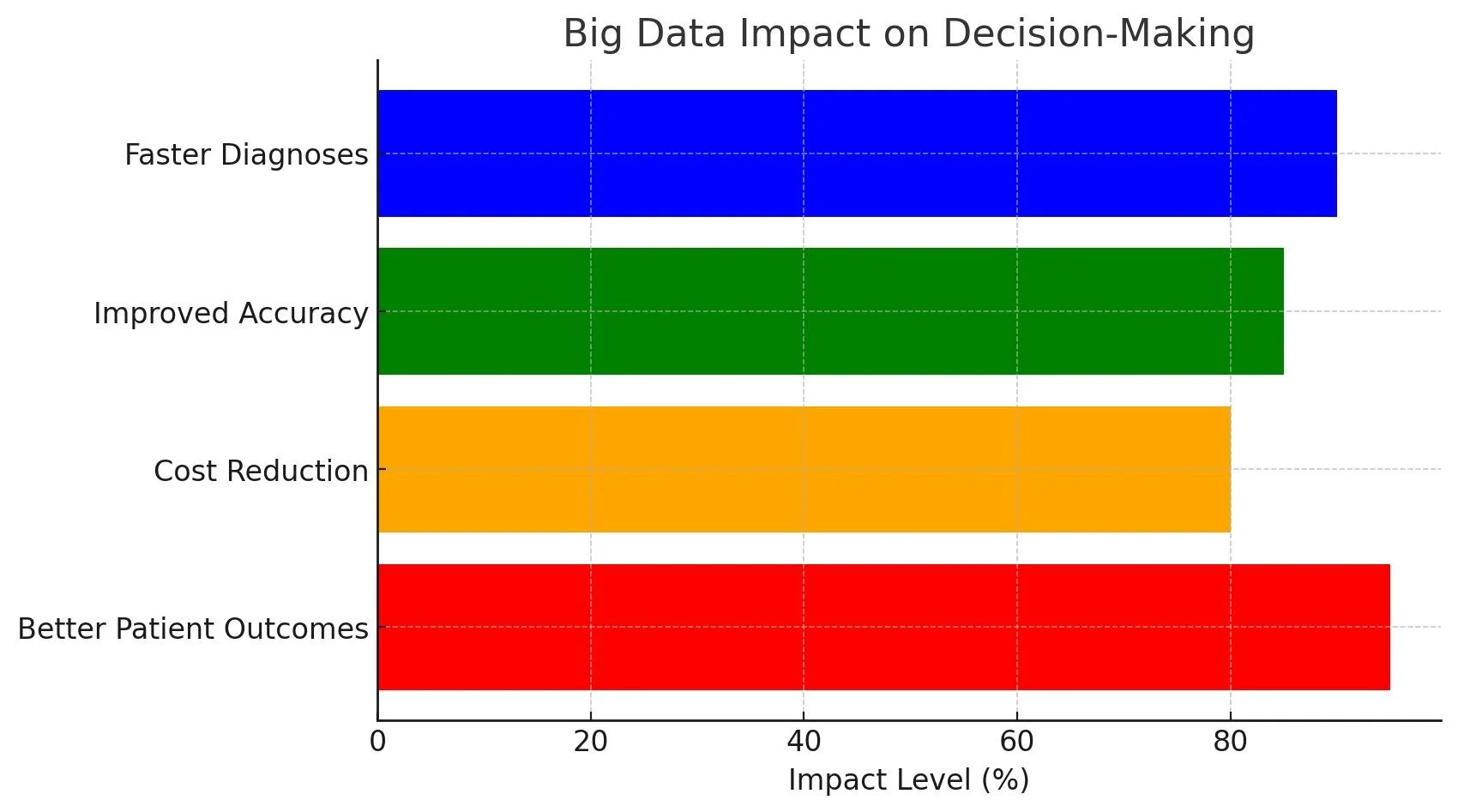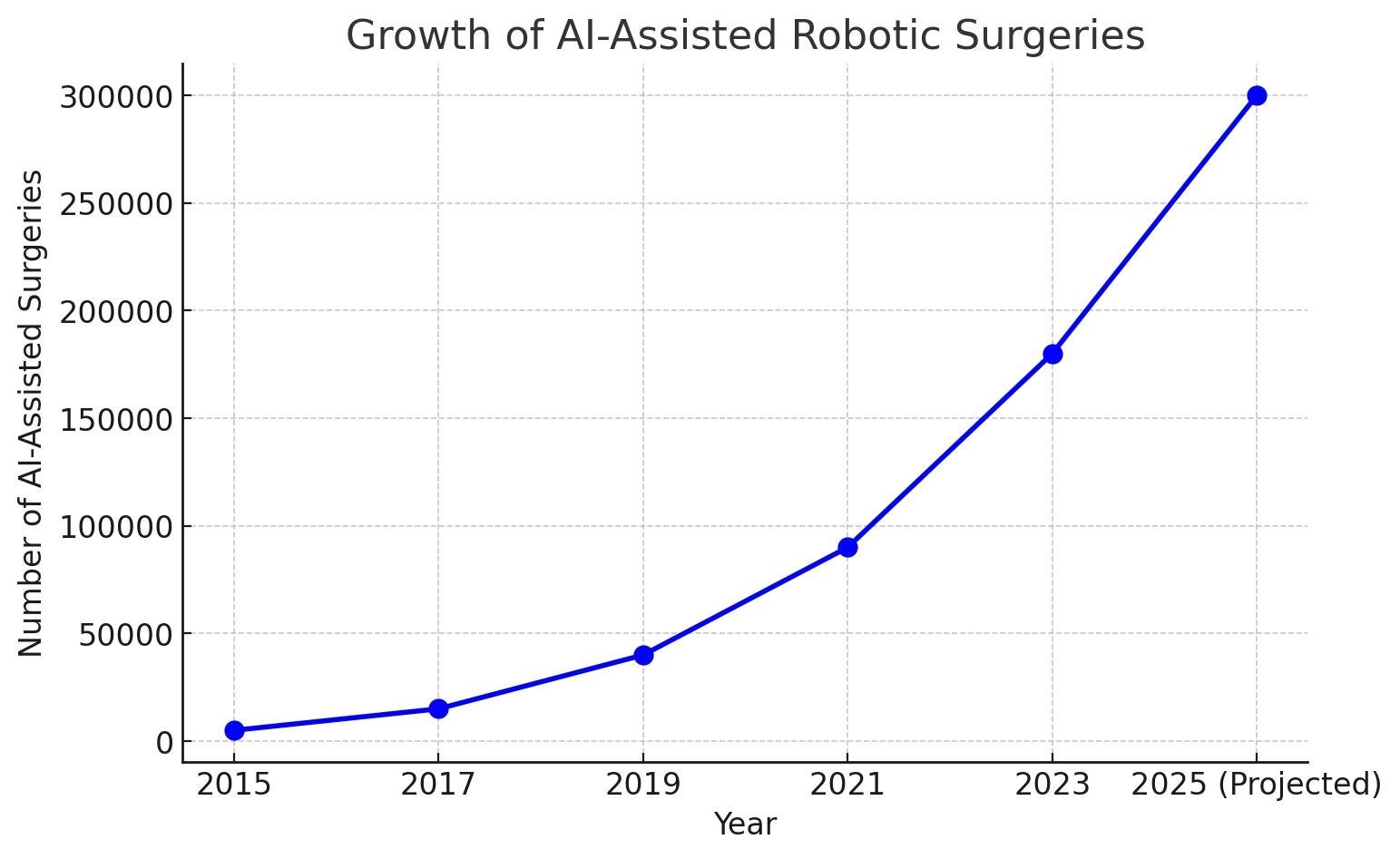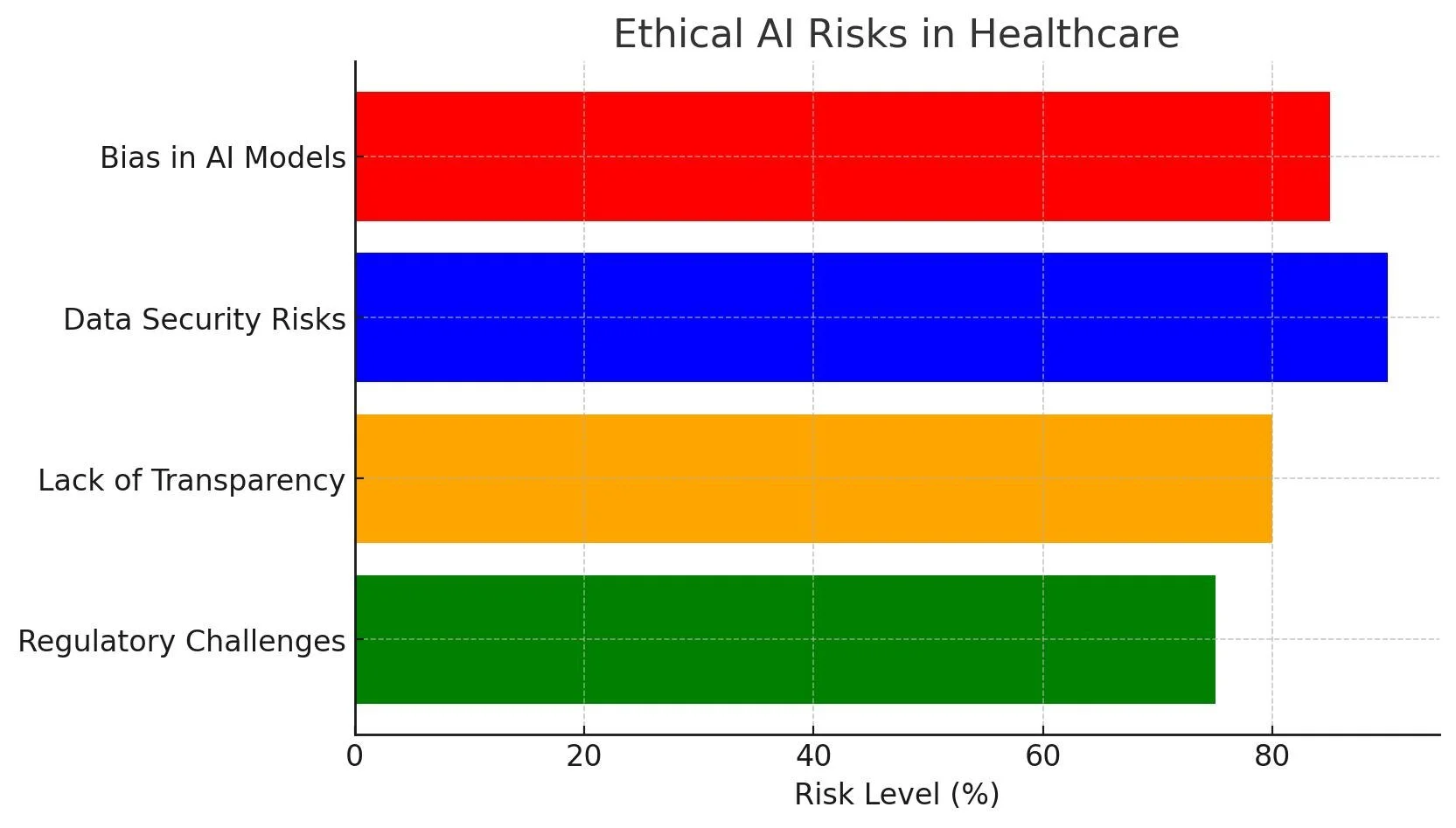Big Data and ML in Healthcare
Potential Big Data and ML in Healthcare solutions.
AI has the potential to greatly enhance the field of healthcare by improving diagnostic accuracy, reducing workload on healthcare providers, reducing costs, and enabling personalized treatment plans. It accomplishes this by streamlining workflow, automating tasks, assisting with diagnosis and treatment optimization, and reducing errors. However, there are also challenges that must be addressed, such as the need for robust ethical frameworks and the potential for AI to exacerbate existing healthcare inequities.
AI has the potential to greatly enhance the field of healthcare by improving diagnostic accuracy, reducing workload on healthcare providers, reducing costs, and enabling personalized treatment plans.
Healthcare is undergoing a transformation driven by Big Data and Machine Learning (ML). With the ability to process vast amounts of structured and unstructured medical data, these technologies are revolutionizing diagnostics, treatment planning, predictive analytics, and personalized medicine.
This article explores how Big Data and ML are reshaping healthcare, discussing real-world applications, challenges, and future directions. We will examine key use cases such as disease prediction, AI-driven diagnostics, hospital management, and patient-centric treatment strategies.
1. Understanding Big Data in Healthcare
Big Data in healthcare refers to the massive volume of patient records, genetic data, medical imaging, real-time monitoring, and hospital management information. The explosion of healthcare data comes from various sources:
* Electronic Health Records (EHRs) – Patient history, prescriptions, and treatment outcomes.
* Medical Imaging Data – X-rays, MRIs, CT scans analyzed with AI.
* Genomic Sequencing – DNA analysis for personalized medicine.
* Wearable Devices & IoT Sensors – Real-time patient monitoring from smartwatches, fitness trackers, and biosensors.
* Public Health Data – Disease outbreaks, epidemiological studies, and population health statistics.
These data points create a complex, interconnected ecosystem that requires AI and ML algorithms to detect patterns, optimize treatments, and improve patient outcomes.
2. Machine Learning in Healthcare: Key Applications
ML is transforming healthcare by offering data-driven insights and automating complex medical tasks. Below are the key areas where ML is making a significant impact:
A. Predictive Analytics for Disease Prevention
Machine learning can analyze vast patient datasets to predict the likelihood of diseases before symptoms appear.
* Early Detection of Chronic Diseases – AI models trained on health records can predict diseases like diabetes, cardiovascular conditions, and cancer.
* Epidemiological Forecasting – ML-powered analytics predict flu outbreaks, COVID-19 spread, and seasonal diseases.
* Personalized Risk Scores – AI assesses individual patient risks based on lifestyle, genetics, and medical history.
B. AI-Driven Diagnostics
ML algorithms are outperforming traditional diagnostic methods by analyzing complex medical imaging and test results:
* Radiology & Imaging Analysis – AI models trained on thousands of MRI, CT, and X-ray scans can detect anomalies faster and more accurately than radiologists.
* Pathology & Biopsy Analysis – ML models can classify cancerous cells in histopathological images with high accuracy.
* AI-Powered Blood Test Analysis – Algorithms detect irregularities in blood biomarkers, improving disease screening.
C. Smart Hospital Management & Workflow Optimization
ML is optimizing hospital operations by predicting patient admissions, reducing wait times, and improving resource allocation.
* Predictive Bed Occupancy – AI models forecast hospital admissions and manage bed availability.
* Automated Staffing Solutions – Machine learning predicts peak hours for better scheduling of doctors and nurses.
* Supply Chain Optimization – AI prevents medicine shortages by tracking inventory in real-time.
D. Personalized Medicine & Drug Discovery
ML is playing a crucial role in tailoring treatments to individual patients and accelerating drug development.
* Genomics-Driven Personalized Therapies – AI analyzes genetic markers to recommend customized treatments.
* AI-Enabled Drug Discovery – Machine learning predicts potential drug candidates, reducing development costs and time.
* Clinical Trial Optimization – AI matches patients to suitable clinical trials, improving research efficiency.
3. The Role of Big Data in Medical Decision-Making
Big Data enables medical professionals to make data-backed, real-time decisions for improved patient care.
📊 Visualization: Big Data Impact on Decision-Making (Wykres przedstawiający wpływ analizy Big Data na różne aspekty decyzji medycznych)
* Faster Diagnoses – AI models process test results instantly.
* Improved Accuracy – Reduces misdiagnosis by finding hidden correlations.
* Cost Reduction – Optimized treatment plans minimize unnecessary tests.
* Better Patient Outcomes – Personalized care leads to faster recovery rates.
4. Challenges of Implementing Big Data & ML in Healthcare
Despite its potential, healthcare AI adoption faces several challenges:
* Data Privacy & Security Risks – Patient confidentiality must be protected while handling sensitive health records.
* Bias in AI Models – ML algorithms must be trained on diverse datasets to avoid bias and discrimination.
* Integration with Legacy Systems – Many hospitals still use outdated healthcare IT infrastructure.
* Regulatory Compliance – Compliance with HIPAA, GDPR, and FDA guidelines is mandatory for AI-driven healthcare solutions.
🔹 Proposed Solutions:
* Federated Learning – Training AI models without transferring patient data to prevent privacy breaches.
* Blockchain for Data Security – Using decentralized ledgers to store medical records securely.
* Transparent AI Models – Developing explainable AI for improved trust among doctors and patients.
5. Future of Big Data & ML in Healthcare
The future of AI in healthcare promises revolutionary changes:
* AI-Powered Robotic Surgeries – Increased precision in minimally invasive procedures.
* Autonomous Diagnostic AI – AI systems offering instant, real-time diagnoses without human intervention.
* AI-Generated Digital Twins – Simulated patient models for testing treatments before real-world application.
* Nanotechnology & AI Integration – AI-driven nanoparticles for targeted drug delivery and real-time monitoring.
Future Trends in AI-Driven Healthcare
Transforming Healthcare with AI & Big Data
Big Data and Machine Learning are redefining healthcare efficiency, precision, and accessibility. These technologies are not just enhancing diagnostics and treatment but also revolutionizing preventive medicine and hospital management.
As AI-driven innovations continue to evolve, the challenge remains in balancing technological advancement with ethical, privacy, and regulatory considerations. If implemented effectively, Big Data and ML will drive a healthcare revolution, making medicine more proactive, personalized, and precise than ever before.
🚀 Healthcare’s AI-driven future is just beginning. The next decade will determine how we harness this power for the benefit of humanity.
6. AI-Powered Healthcare Chatbots & Virtual Assistants
AI-driven chatbots and virtual assistants are transforming patient engagement by providing instant medical advice, symptom checking, and appointment scheduling. These tools leverage natural language processing (NLP) and machine learning to assist both patients and medical professionals.
Key Applications:
* AI Chatbots for Triage – Platforms like Babylon Health provide preliminary diagnoses based on patient symptoms.
* Mental Health AI Assistants – AI-powered therapy apps like Woebot provide CBT-based mental health support.
* Automated Patient Follow-Ups – AI assists in monitoring chronic disease patients via text or voice.
AI Chatbot Use Cases in Healthcare
7. AI and Big Data for Medical Research & Drug Development
Big Data is playing a critical role in accelerating drug discovery and medical research, reducing costs, and enhancing the efficiency of clinical trials.
How AI Transforms Medical Research:
* AI-Powered Drug Discovery – Algorithms analyze chemical compounds and predict drug effectiveness.
* Genome-Wide Association Studies (GWAS) – ML finds genetic risk factors for diseases.
* AI-Driven Clinical Trials – AI selects ideal candidates for clinical research, optimizing outcomes.
AI-Accelerated Drug Discovery Process
8. Real-Time Big Data Analytics for Disease Surveillance
Big Data enables real-time tracking of disease outbreaks by analyzing health records, social media trends, and satellite data.
Real-World Applications:
* COVID-19 Pandemic Tracking – AI-driven models predicted infection spread.
* Predicting Seasonal Flu Outbreaks – Google Flu Trends analyzed search queries to estimate flu activity.
* Monitoring Chronic Diseases in Populations – AI detects patterns in hospital admissions.
📊 Visualization: Real-Time AI Disease Surveillance Networks (Wykres przedstawiający globalną mapę monitorowania chorób z AI)
9. AI-Driven Robotics in Surgery and Patient Care
AI and robotics are enhancing precision, efficiency, and safety in minimally invasive surgeries and patient monitoring.
Notable Developments:
* AI-Assisted Robotic Surgery – Da Vinci Surgical System enhances surgeon precision.
* Exoskeletons for Rehabilitation – AI-powered robotic limbs assist paralyzed patients in regaining mobility.
* AI Monitored ICUs – AI alerts doctors to critical changes in patient vitals.
Growth of AI-Assisted Robotic Surgeries
10. AI-Powered Predictive Healthcare for Preventive Medicine
ML and predictive analytics allow early detection of health risks, ensuring timely intervention and reducing hospitalization rates.
Predictive Healthcare Use Cases:
* AI-Driven Heart Attack Prediction – Machine learning detects cardiovascular risk based on EHR data.
* Personalized Cancer Screening – AI analyzes genetic markers for early tumor detection.
* Chronic Disease Risk Scores – AI predicts diabetes, hypertension, and neurodegenerative diseases.
Predictive Healthcare Impact on Reducing Hospitalization
11. AI & Big Data for Personalized Nutrition and Wellness
Big Data is reshaping nutrition science by personalizing dietary plans based on DNA, microbiome analysis, and health history.
Innovations in Personalized Nutrition:
* AI-Guided Diet Plans – Apps like Zoe analyze gut bacteria for customized nutrition plans.
* Wearable Nutrition Trackers – AI-powered wearables monitor glucose and metabolic health.
* AI-Based Food Allergen Detection – Smart sensors scan food composition for allergy prevention.
12. Ethical Considerations & Challenges in AI-Driven Healthcare
Despite its benefits, AI in healthcare raises concerns regarding privacy, security, bias, and regulatory challenges.
Major Ethical Concerns:
* Bias in AI Models – ML trained on non-diverse datasets can lead to discrimination.
* Data Security Risks – Patient data breaches pose serious privacy threats.
* AI Decision Transparency – Black-box AI models lack explainability for critical healthcare decisions.
* Regulatory Compliance – AI-driven medical tools must adhere to HIPAA, GDPR, and FDA standards.
Ethical AI Risks in Healthcare
AI and Big Data are revolutionizing every aspect of healthcare, from diagnostics to surgery and predictive medicine. As we move forward, the focus should be on ethical AI adoption, enhanced security, and continued innovation.
Key Takeaways:
✅ AI-driven predictive analytics is reducing hospitalization rates.
✅ Robotic-assisted surgeries enhance precision and recovery times.
✅ AI-powered drug discovery is cutting development time by 50%. ✅ Real-time Big Data analytics enable faster disease tracking and prevention.
🚀 The future of healthcare lies in AI-driven precision medicine, ensuring better patient outcomes,
educed costs, and improved global health systems.
Holographic technical in MRI
Modern technologies based on big data and machine learning have a profound impact on many aspects of daily life. Streaming platforms such as Netflix accurately predict user preferences, while Google analyzes search histories to provide more relevant results. Increasingly, companies and institutions, including Google, are replacing traditional algorithms with more advanced machine learning solutions. This shift is expected to drive significant advancements across various sectors, particularly in medicine.
Despite the enormous potential of machine learning, it is not an infallible tool. Algorithms, particularly those at the higher end of the machine learning spectrum, often function as "black boxes," meaning their decision-making processes are not always transparent. Additionally, they require vast amounts of training data, which raises challenges related to privacy and ethics. In medicine, where patient health and lives are at stake, it is crucial to adhere to best analytical practices and ensure that models are not only accurate but also interpretable.
Recent advances in big data and machine learning have made highly automated algorithms increasingly useful in medicine. Supercomputers process massive volumes of information, enabling more precise diagnoses and personalized treatment plans. Despite the challenges associated with the development of this technology, its role in healthcare will only continue to expand, making artificial intelligence an integral part of modern medicine.
J.Shaw MD/PhD, L.Peng MD, A.Boire PhD











